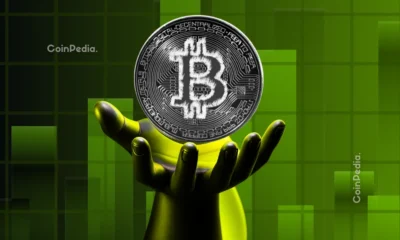Bitcoin
Tether Is Buying Bitcoin’s Revolution, How Devastating Will The Consequences Be?

Credit : bitcoinmagazine.com
At a look
- The GENIUS law within the US, personal stablecoin issuers supplied a authorized framework whereas blocking a government-issued CBDC.
- Tether, writer of USDT, achieved file income and have become one of many largest private holders of US government bonds.
- The corporate’s collaboration with regulators and regulation enforcement companies reveals how stablecoins act as compliance railsnot as an alternative choice to it.
- Many Bitcoin proponents at the moment are becoming a member of Tether’s ecosystem and inadvertently serving to to increase the fiat system they declare to oppose.
Bitcoin’s silent compromise
When the GENIUS Act became law on July 18, 2025the crypto trade celebrated this as the top of regulatory uncertainty. The regulation requires licensed stablecoin issuers to keep up liquid reserves, corresponding to money and U.S. Treasury bonds, publish month-to-month disclosures and subject to federal or state oversight. On the similar time, Congress suspended a federal central financial institution digital forex.
Supporters noticed this as a victory for innovation, however critics referred to as it a silent federalization of personal cash. The USA not must challenge its personal digital greenback. It has merely delegated this operate to non-public issuers working underneath supervision. For Bitcoiners, whose motion was constructed round sound, decentralized cash, that shift ought to have set off alarm bells.
Tether’s personal empire
The largest beneficiary of this new framework is Tether Restricted, whose USDT token dominates the worldwide stablecoin provide. In its attestation for the second quarter of 2025 Tether Limited reported net income of approximately $4.9 billion and total US Treasury exposure of more than $127 billion. Treasury payments and reverse repo holdings. The stability virtually confirmed $120 billion in government bondsmaking Tether one of many world’s largest personal holders of US authorities debt.
The custody of these assets rests with Cantor Fitzgeraldthe Wall Avenue agency led by Howard Lutnick. Lutnick has publicly defended the soundness of Tether’s reserves, affirming Cantor’s function as custodian whereas emphasizing that the corporate has no fairness stake within the firm.
The connection is now extra delicate: Lutnick was later nominated for a top economic position in the White House overseeing components of commerce and monetary regulation. That appointment places a federal policymaker in shut proximity to one of many largest personal holders of U.S. authorities debt and the principle custodian of an organization whose dollar-backed token is determined by U.S. Treasury bonds for income. The optics are uncomfortable. What began as a enterprise relationship is now blurring into a possible battle of curiosity, entrenching Tether within the conduits of Wall Avenue and the political equipment that controls it.
In impact, Tether has turn out to be a non-public central financial institution: it points greenback debt, earns seigniorage, and distributes liquidity by means of the crypto financial system, all whereas leaning on U.S. authorities debt. Earnings per worker rival these of essentially the most worthwhile monetary establishments.
Surveillance by way of proxy
Stablecoins promise quick, borderless funds; nevertheless, their structure relies on compliance. Since December 2023 Tether has a proactive wallet freeze policy for addresses authorised by the U.S. Workplace of Overseas Belongings Management. The corporate says it has frozen billions in tokens linked to unlawful actions now works directly with the US Secret Service and the FBI.
This is not essentially sinister, it is what regulators demand, nevertheless it means enforcement now takes place throughout the cash itself. The management lever not lies with the banks alone, however within the sensible contract of the token issuer.
Whereas Tether USDT expands to adjoining Bitcoin networks corresponding to Liquid and the RGB protocolwill journey with the identical compliance logic. The extra Bitcoin infrastructure hosts these tokens, the extra id, KYC and whitelisting mechanisms will emerge round Bitcoin wallets and fee channels. The community that when prided itself on its neutrality is in peril of changing into a conduit for surveillance rails.
The political financial system of the digital greenback
The GENIUS Act This passage has additionally realigned the politics of digital currencies. The sponsors referred to as it an anti-CBDC measure, arguing that personal stablecoins protect freedom of alternative and restrict authorities energy. The consequence, nevertheless, is nearly equivalent to what a central financial institution digital forex would obtain: programmable, traceable {dollars}, solely managed by firms as an alternative of the Fed. Some analysts name this the delivery of a ‘CBDC by proxy.”
The coverage additionally suits in properly with finances priorities. Each USDT minted represents demand for short-term authorities bonds, primarily funding the identical authorities that stablecoin proponents declare they wish to circumvent. Tether’s income come from the curiosity paid on these securities, an invisible subsidy of presidency debt to non-public issuers.
By inserting stablecoins throughout the conventional bond market, the US has created a dollar-based suggestions loop: Bitcoin demand helps Treasury issuance, and Treasury yields assist Bitcoin’s profitability. In that cycle, decentralization is incidental.
Co-opting the Bitcoin story
Inside the Bitcoin group, opposition to altcoins stays robust, however sponsorships, occasion partnerships, and integrations present how shortly the precept is popping to funding. Bitcoin conferences more and more characteristic Tether executives and supporters on stage, usually framed as “bridges” to adoption.
A well-recognized chorus has emerged amongst Bitcoiners taking cash from Tether: “If stablecoins are inevitable, it is higher that they’re run by Bitcoiners.” One other well-liked protection is that Tether supplies a lifeline to folks in nations locked out of the greenback system or affected by hyperinflation and collapsing economies. That is an emotionally compelling story. These helpful mantras flip compromises into virtues, permitting Bitcoiners to obtain sponsorship and funding from the identical system they as soon as swore in opposition to.
That logic could present consolation to some, nevertheless it compromises readability. USDT on Bitcoin Does not Make Bitcoin Extra Sovereign; it makes the greenback extra ubiquitous. When Bitcoin builders or proponents align themselves with Tether for sponsorship or publicity, they lend ethical legitimacy to a system that thrives on the dominance of fiat. The irony is that Bitcoin’s fiercest defenders at the moment are serving to to anchor the very construction it was constructed to flee from.
Comply with the cash
Tether’s dimension provides it energy in markets and messaging. With billions in annual income and deep ties to Wall Avenue custodians, it might probably sponsor conferences, fund analysis and affect tales within the digital asset world. Its executives recurrently seem at coverage boards to current stablecoins as allies of innovation and freedom. Every look helps normalize the concept regulated, dollar-denominated tokens characterize progress for Bitcoin.
However the cash tells a unique story. Each stablecoin transaction settled in USDT extends the attain of the greenback system and perpetuates the weaponization of cash. Every layer of compliance embeds surveillance extra deeply into the blockchain financial system. And each Bitcoiner who accepts this trade-off helps construct a community by which decentralization primarily exists within the type of branding.
Bitcoin does not want a conspiracy in opposition to it; it simply wants its followers to overlook what made it completely different. The GENIUS Act, the rise of Tether, and the regulator’s choice for personal rail all level to a future the place digital money exists, however by no means with out consent. The Computer virus just isn’t Tether, it’s the perception that working with it ensures freedom.
Finally, too many Bitcoiners stay proper the place Tether needs them, nonetheless tethered to the system they’re attempting to flee.
It is a visitor publish from Plain Memo. The opinions expressed are completely their very own and don’t essentially replicate these of BTC Inc or Bitcoin Journal.
-

 Analysis3 months ago
Analysis3 months ago‘The Biggest AltSeason Will Start Next Week’ -Will Altcoins Outperform Bitcoin?
-

 Blockchain1 year ago
Blockchain1 year agoOrbler Partners with Meta Lion to Accelerate Web3 Growth
-

 Meme Coin9 months ago
Meme Coin9 months agoDOGE Sees Massive User Growth: Active Addresses Up 400%
-

 Videos1 year ago
Videos1 year agoShocking Truth About TRON! TRX Crypto Review & Price Predictions!
-

 NFT12 months ago
NFT12 months agoSEND Arcade launches NFT entry pass for Squad Game Season 2, inspired by Squid Game
-

 Web 33 months ago
Web 33 months agoHGX H200 Inference Server: Maximum power for your AI & LLM applications with MM International
-

 Meme Coin1 year ago
Meme Coin1 year agoCrypto Whale Buys the Dip: Accumulates PEPE and ETH
-

 Videos5 months ago
Videos5 months agoStack Sats by Gaming: 7 Free Bitcoin Apps You Can Download Now







